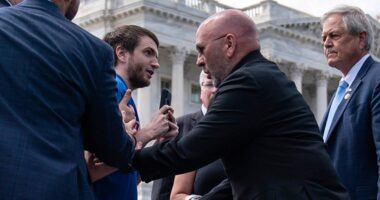
U.S. household income rose for the first time in three months in December as a new round of government-aid efforts kicked in, priming the economy for stronger growth this year once the pandemic recedes and businesses fully reopen.
Household income—what families received from wages, investment returns and government-aid programs—climbed 0.6% from the prior month, the Commerce Department said Friday.
The rise partly reflected federal-aid programs, such as enhanced unemployment benefits, that kicked in at the end of the year. Income is expected to rise further this quarter as the government distributes federal stimulus checks of $600 to most households.
Americans have had limited ways to spend their money, because of pandemic-related shutdowns. Consumer spending fell 0.2% last month, marking the second straight monthly decline. Households cut spending broadly on goods, particularly big-ticket items such as cars and household appliances, while spending on services rose only slightly.
The weak spending has left Americans with historically high savings that could enable them to boost spending later this year. The personal savings rate rose to 13.7% last month, far higher than the pre-pandemic level of roughly 8%. Excluding last year, the savings rate is at the highest level since 1975.
While government aid programs, a booming stock market and rising home values have put households on solid footing financially, consumers haven’t been able or willing to dine out, go to concerts or on vacation. Late last year, many state and local governments forced businesses to shut down again or scale back operations to combat another wave of the coronavirus.
“The consumer has plenty of money to spend and looks like maybe is going to get some more soon if we get yet another round of rebate checks,” said Stephen Stanley, chief economist at Amherst Pierpont. “But the opportunity just isn’t there” to spend it.
Many households are still suffering. The jobless rate of 6.7% in December is far higher than the February level of 3.5%. Many businesses have closed.
But households collectively saved $1.4 trillion in the first nine months of last year, about twice as much as what they saved in the same period a year earlier, according to Berenberg Economics. Most received one-time cash payments of $1,200 last year as part of a broad federal package to help them weather the economic downturn. Millions of unemployed workers also received enhanced unemployment benefits—$600 a week at one point, on top of their normal jobless compensation.
Household income is expected to grow further in early 2021, as the federal government mails one-time cash payments of $600 to most families and provides $400 a week in special benefits to unemployed workers on top of their normal jobless compensation. And tens of millions of Americans with federal student loans have had their monthly payments temporarily waived, interest-free, since last March, freeing up hundreds of dollars a month for the typical borrower.
President Biden, a Democrat who took office this month, has proposed a $1.9 trillion stimulus package.
So far, though, consumers—and the economy—have been hamstrung by the pandemic. Many shoppers remain wary of spending time in public with the virus still spreading. Others want to shop but have been prevented from doing so in big states like California, which until recently mandated that businesses, such as restaurants, stop serving patrons in person.
Bill Dwyer, who retired in Chillicothe, Ill., after spending many years as a technician for a heavy-equipment manufacturer, said he and his wife are living comfortably, given pensions and Social Security checks. But the 77-year-old has cut spending on certain activities during the pandemic, including going out to brunch and taking group camping trips at historic sites.
A Weak Economy
“I miss going to town, for breakfast and stuff like that,” Mr. Dwyer said.
On a recent day, he was headed to get his first vaccine shot. He said once the country reaches herd immunity—some economists think that will happen as early as this summer—he will resume certain spending activities, albeit cautiously.
Weak household spending is one big reason why the economic recovery lost momentum in the fourth quarter, growing at an annual rate of 4% compared with the third quarter’s breakout 33.4% annual growth rate. The economy shrank by 3.5% in 2020, compared with the prior year.
Economists expect growth to slow further this quarter. The forecasting firm IHS Markit projects that output will expand at a 2.8% rate in January through March. But economists believe growth will pick up in the spring, as more Americans get vaccinated and business restrictions ease. In recent days, elected leaders in California and Washington, D.C. have eased restrictions on businesses, including restaurants.
By submitting your response to this questionnaire, you consent to Dow Jones processing your special categories of personal information and are indicating that your answers may be investigated and published by The Wall Street Journal and you are willing to be contacted by a Journal reporter to discuss your answers further. In an article on this subject, the Journal will not attribute your answers to you by name unless a reporter contacts you and you provide that consent.
Write to Josh Mitchell at [email protected]
Copyright ©2020 Dow Jones & Company, Inc. All Rights Reserved. 87990cbe856818d5eddac44c7b1cdeb8









